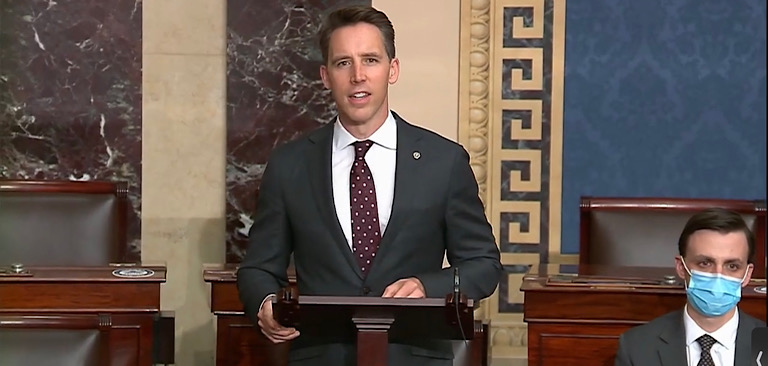Senator Hawley’s attempt to force a vote on the Senate floor for his “Limiting Section 230 Immunity to Good Samaritans Act” has been blocked by Democrats.
When introducing the bill, Hawley accused the Big Tech platforms of “trying to use their power to shape the outcome of the election” and engaging in escalating acts of censorship against conservatives. He also cited Big Tech’s censorship of President Trump, censorship of pro-life groups, and Google’s threat to demonetize The Federalist.
Hawley positioned the bill as a “simple, straightforward solution to the censorship power of these digital platforms.”
The bill itself would have affected platforms with more than with more 30 million users in the US or 300 million users worldwide and revenues of more than $1.5 billion.
It sought to limit the scope of the immunity from legal liability that Big Tech platforms receive under Section 230 of the Communications Decency Act and would have allowed users to sue Big Tech platforms when they censor user’s speech in “bad faith.” If successful, users cold have received a payout of $5,000 or actual damages (whichever is higher) plus any legal fees incurred.
When the bill was announced, there were several points upon which it was likely to be challenged such as its vague language (which creates wiggle room for challenges) and a requirement in the bill forcing platforms to maintain written terms of service that take precedence over other terms (which tech companies would have likely argued removes their ability to be fluid when moderating content).
Hawley tweeted that the Democrats blocked the vote to protect “the Big Tech corporations who fill their coffers.”
The blocking of Hawley’s bill follows the Department of Justice (DOJ) releasing its proposal to reform Section 230 on Wednesday.
Some of the changes proposed by the DOJ include changing the language related to the immunity Big Tech companies currently receive under Section 230 when they act in “good faith” to remove or edit content that they deem to be “otherwise objectionable.” It’s also likely that tech companies would simply use the First Amendment as a defense even if they were sued for censoring content.
The DOJ proposed changing the “otherwise objectionable” language to “unlawful” and “promotes terrorism” and adding a statutory definition of “good faith” which would “limit immunity for content moderation decisions to those done in accordance with plain and particular terms of service and accompanied by a reasonable explanation, unless such notice would impede law enforcement or risk imminent harm to others.”
However, like with Hawley’s bill, these proposals could also be challenged based on vague language (Big Tech already uses the vague term “harmful” to justify its arbitrary censorship yet the term “harm” is being used in this DOJ proposal) and Big Tech firms will likely argue that limiting the scope of their immunity to particular terms of service prevents them from moderating with fluidity.













